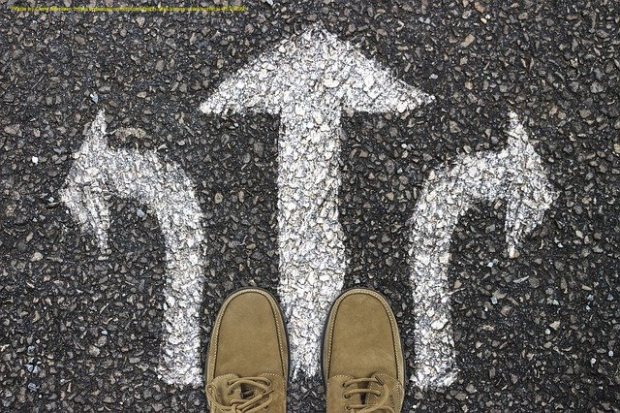
February 2022
This month's voice:
Gregory S. Lewis, "What-Ifs"
Introduction
Lindsay Herron
Editor, KOTESOL Voices
I love stories involving alternate timelines and time-loops—narratives that explore how minor deviations from an initial path can lead to different outcomes, that challenge us to wonder how our own lives might be different today had we made slightly different choices in the past. That's one reason why I so thoroughly enjoyed this month's KOTESOL Voices contribution by Yongin-Gyeonggi Chapter member Greg Lewis—and why I suspect his words will resonate so strongly with our readers. Can you pinpoint the chance encounters and choices that led to where you are today? How would your own story be different if you had made different decisions at those crossroads in your past? Greg's piece invites introspection even as it offers a peek into his own perambulatory path. Even better, you can listen to this engaging narrative related in Greg's own (very soothing) voice; don't miss the audio link (also embedded below as a YouTube video). Happy reading/listening!
What-Ifs
Gregory S. Lewis
[Listen to the audio on YouTube]
My Grade 1 teacher at Summitview Public School in Stouffville, Ontario, wrote on my report card, “Stay curious, Greg.” Like any good teacher at that stage, she knew me better than I knew myself. The curiosity, though, has been a blessing and a curse. Being a “curious” sort of person (the ambiguity of that is not lost on me) I will often veer off on a whim to watch or investigate whatever catches my attention. I learn new stuff—that’s the upside. I get a different perspective; I learn something new; I discover something; I explore; and therefore, I’m happy and mostly satisfied on the inside.
Of course, there is a downside to such behavior. The downside is that I don’t stay on point very well and thus seldom reach a complete understanding of whatever it was that I was originally heading towards. Take walking for exercise as an example. I will stop at the drop of a hat to watch building construction and large machinery digging holes, or stop and check what’s new on an old path, or investigate where a new path leads. In doing so, I am delayed; I forget where I was going; and I miss whatever may have been waiting just around the corner had I stayed my course. And if I ponder that very possibility, I just may wander past the busy workmen and their cool machinery to sniff out what’s around the bend. To a casual observer, I must appear lost. This propensity of mine to flit like a finch from this branch to the next has broader ramifications that I have taken a few moments to examine. Herein are the results.
While in Canada, for the first eighteen years of my children’s lives, we moved thirteen times, and I held about half that many jobs. Yes, I was young, and yes, the country was full of opportunity in those years; but I know of at least two friends who got a job right out of high school and stayed at the same employer in the same town and have done much better than I’ve done in terms of personal wealth. Did they live their best life? That’s not for me to say. To my mind, they envied the exotic lifestyle I enjoyed living in a foreign country with half the year off to travel. However, I could be wrong.
What if I had stayed in Canada and never gone to Korea?
In 2001, I had just lost the election to be the first mayor of the new city of Kawartha Lakes; and had I stayed, I’m sure I would have found my way back into municipal politics. I loved it. It was definitely an ego trip, but it was also an opportunity to do some good in my community. I needed to do some redemptive good because my income came from being a real estate salesperson, which my father made very clear was akin to being a lost soul. I really wasn’t great at it but good enough to manage to buy some income-generating rental property. Looking back now, I believe that had I stayed in Canada, I would have continued on my path to acquiring more rental properties, becoming a more successful landlord, and also continued my political career on the side to garner points for my poor lost soul.
But I didn’t stay in Canada. I came to Korea. I came a couple times while still keeping one foot in Canada, then eventually came to stay in 2008, giving up my real estate license and beginning a new career teaching English. The thing is, I like teaching more than I like real estate sales. It’s more stable than selling homes, and I like trying to figure out what makes my students tick better than convincing potential homebuyers to take the leap. But teaching in Korea has a cost, and that cost I have come to realize is a very personal cost. You see, when I came to Korea, I quickly realized that all I needed to be successful was to be Canadian, male, White, and English-speaking. I was suddenly gold. I only needed to show that I had graduated from a Canadian university—in any discipline—and I was hired. Sure, there was a little competition, but I also had an age advantage which was perceived as maturity. Most new English teachers like me were young and just out of university. I had this air of maturity that seemed to push aside any possible questions as to my actual ability, and magically, doors opened. I would have had to try really hard to fail, in order to have my value even questioned. Quite ridiculous, to be sure; but still, it was pretty heady stuff.
Had I stayed in Canada, I would have had to work to prove my value and worth to potential employers on a drastically different scale. I believe the result would have garnered me a truer sense of self and thus better equipped me to manage failure and criticism. Take politics as an example. I had to constantly prove myself over the three years of my term; and then every three years, I had to fight against all comers in an election to prove that I was still more valuable than the next person. Even then, I might lose, as I did in 2001.
The bottom line is that changing careers—or direction when walking, or countries to call home… there’s always an upside and a downside. It’s best to accept that fact, then carry on like you’re in your right mind.
About the Author

In the summer of 1995, Greg Lewis bumped into a Canadian teaching English in Tokyo. That was his first introduction to teaching English abroad. After getting sidetracked for a bit providing business training to realtors in Canada and the U.S.—one of a few diversions in the intervening decade—he landed in Korea. Greg has focused on adult English learners for the most part and now teaches freshman English at Hyupsung University, south of Seoul. A resident of Yongin, Greg has been a Yongin-Gyeonggi Chapter member since 2018, where he currently hosts the Yongin-KOTESOL Podcast. Greg also hosts The Morning Hike podcast where he consults with 참새 and 박새 on all manner of early-morning matters.


